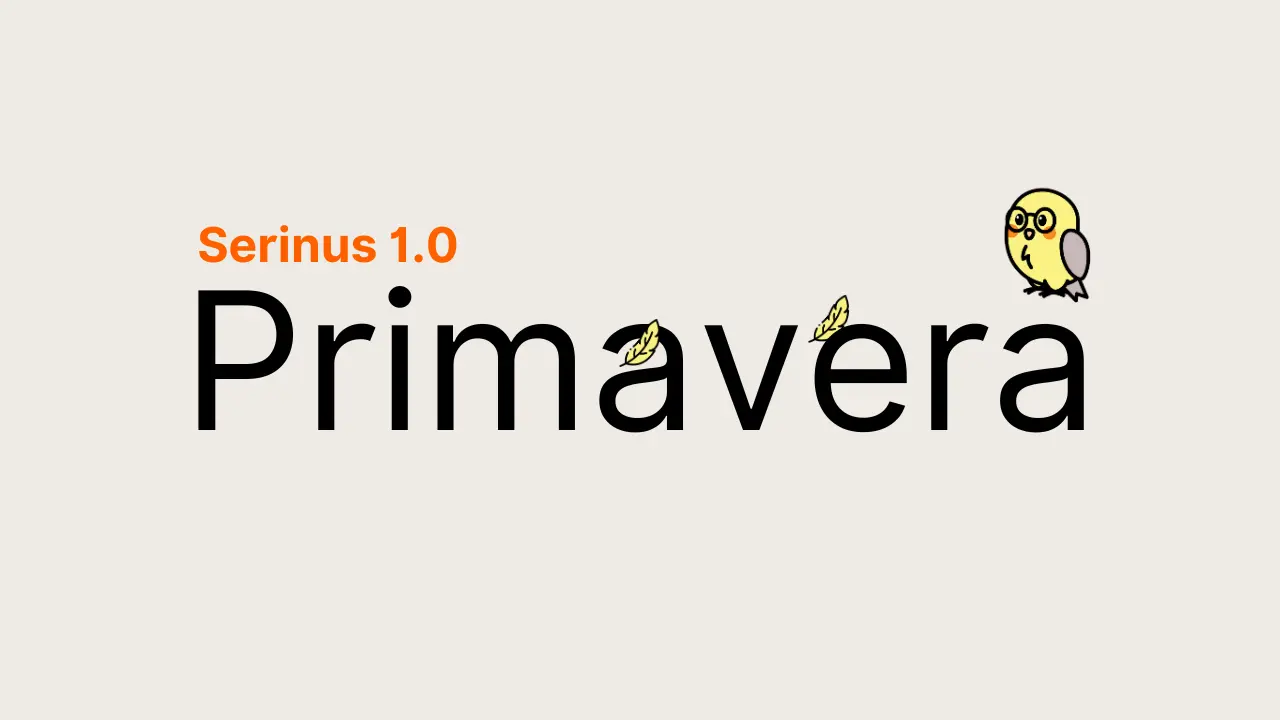releases
Serinus 1.0 - Primavera

Francesco Vallone
26 Nov 2024ー@francescovll

Serinus 1.0, code name Primavera, is the first stable release of Serinus. It introduces ModelProvider, Client Generation, typed bodies and many other features.
Table of Contents
What is Serinus?
Serinus is an open-source framework for building efficient and scalable backend applications powered by Dart.
What's new in Serinus 1.0?
A lot! And when I say a lot, I mean a lot. But let's go step by step.
ModelProvider
ModelProvider is a new feature that allows you to define your models that can be encoded and decoded from JSON.
Differently from other frameworks, Serinus doesn't enforce you to use a specific library or a specific way to define your models. You can use the one you prefer, and Serinus will take care of the rest.
And if a library doesn't use the toJson and fromJson methods? No problem you can just tweak a little the configuration in your pubspec.yaml file, and you are good to go.
Oh and if the model doesn't look for a Json body but for a form-data body? No problem, the ModelProvider can handle that too.
import 'package:serinus/serinus.dart';
class User {
final String name;
final String email;
User({required this.name, required this.email});
Map<String, dynamic> toJson() {
return {
'name': name,
'email': email,
};
}
factory User.fromJson(Map<String, dynamic> json) {
return User(
name: json['name'],
email: json['email'],
);
}
}import 'package:serinus/serinus.dart';
class AppController extends Controller {
AppController({this.path = '/app'}) {
on(Route.post('/'), body: User, _createApp);
}
Future<String> _createApp(RequestContext context, User body) async {
return 'App ${body.name} created';
}
}import 'package:serinus/serinus.dart';
class GenModelProvider extends ModelProvider {
@override
Map<Type, Function> get fromJsonModels => {
User: (json) => User.fromJson(json),
}
@override
Map<Type, Function> get toJsonModels => {
User: (model) => (model as User).toJson(),
}
@override
Object from(Type model, Map<String, dynamic> json) {
return fromJsonModels[model]!(json);
}
@override
Map<String, dynamic> to<T>(T model){
return toJsonModels[model.runtimeType]!(model);
}
}You can find more information about ModelProvider in the documentation.
Client Generation
Client Generation is another new feature that allows you to generate a client for your API.
Streamline your development process making easier to interact with your API is one of the main goals of Serinus, and Client Generation is a step in that direction.
Right now the client generation is available only for Dart and will use the library Dio, but we are working to make it available for other languages and libraries too.
You can find more information about Client Generation in the documentation.
Typed Body
One of the things we wanted to improve in Serinus was the usage of the body of the request. In the previous version of Serinus, the body could just be one of the followng types:
StringList<int>Map<String, dynamic>FormData
From the 1.0 this problem is solved. Now you can use any type you want without worring about the serialization or deserialization of the body.
WARNING
To use a custom type as the body of the request you need to use the ModelProvider.
Here is an example of how it works:
import 'package:serinus/serinus.dart';
class AppController extends Controller {
AppController({this.path = '/app'}) {
on(Route.post('/'), body: String, _createApp);
}
Future<String> _createApp(RequestContext context, String body) async {
return 'App $body created';
}
}If you want to know more about Typed Body, you can read the documentation.
Static Routes
Another new feature is the Static Routes. Static Routes are routes that just return a static value.
This can be useful when you need to return a static value without doing any computation.
A static route can be created using the onStatic method in the controller.
import 'package:serinus/serinus.dart';
class AppController extends Controller {
AppController({this.path = '/app'}) {
onStatic(Route.get('/'), 'Hello World');
}
}If you want to know more about Static Routes, you can read the documentation.
Parametrized Handlers
Do you remember? Developer Experience is one of the main goals of Serinus, and we are always looking for ways to improve it.
One of the new features that improve the Developer Experience is the Parametrized Handlers.
What we mean by that? We mean that instead of getting the Path Parameters from the RequestContext you can get them directly in the handler.
import 'package:serinus/serinus.dart';
class AppController extends Controller {
AppController({this.path = '/app'}) {
on(Route.get('/:id'), _getApp);
}
Future<String> _getApp(RequestContext context, String id) async {
return 'App $id';
}
}Don't worry, you can still get them from the RequestContext if you prefer.
WARNING
If you use a Parametrized Handler and a Typed Body, the Typed Body will be the first parameter after the RequestContext.
If you want to know more about Parametrized Handlers, you can read the documentation.
More lifecycle hooks
In Serinus 1.0 we added more lifecycle hooks to the application.
Now you can use two new lifecycle hooks OnApplicationBootstrap and OnApplicationReady.
The first one will be called after the application is created and before the server is started, while the second one will be called after the server is started.
import 'package:serinus/serinus.dart';
class HelloProvider extends Provider with OnApplicationBootstrap, OnApplicationReady {
@override
Future<void> onApplicationBootstrap() async {
print('Application is bootstrapping');
}
@override
Future<void> onApplicationReady() async {
print('Application is ready');
}
}You can read more about Lifecycle Hooks in the documentation.
Simplified access to application configuration
In Serinus 1.0 we simplified the global prefix.
Now you can set the global prefix using the globalPrefix setter in your application.
import 'package:serinus/serinus.dart';
void main() async {
final app = await serinus.createApplication(
entrypoint: AppModule(),
host: '0.0.0.0',
port: 3000
);
app.setGlobalPrefix('/api');
app.globalPrefix = '/api';
await app.serve();
}We also simplified the view engine configuration.
Now you can set the view engine using the viewEngine setter in your application.
import 'package:serinus/serinus.dart';
void main() async {
final app = await serinus.createApplication(
entrypoint: AppModule(),
host: '0.0.0.0',
port: 3000
);
app.useViewEngine(MyViewEngine());
app.viewEngine = MyViewEngine();
await app.serve();
}And also the versioning configuration.
Now you can set the versioning using the versioning setter in your application.
import 'package:serinus/serinus.dart';
void main() async {
final app = await serinus.createApplication(
entrypoint: AppModule(),
host: '0.0.0.0',
port: 3000
);
app.enableVersioning(type: VersioningType.uri);
app.versioning = VersioningOptions(type: VersioningType.uri);
await app.serve();
}Framework Configuration
If you have ever created a Serinus project using the CLI, you may have noticed a file called config.yaml. This file was used until the 1.0 to configure your application.
In the 1.0 we decided to remove it and use the pubspec.yaml file to configure your application.
This will make it easier to manage the configuration of your application and will make it easier to share your configuration with others.
Logger Prefix
In the 1.0 you can set a prefix for the logger.
This will allow you to have a more readable log and to identify the log of your application.
import 'package:serinus/serinus.dart';
void main() async {
final app = await serinus.createApplication(
entrypoint: AppModule(),
host: '0.0.0.0',
port: 3000
);
app.loggerPrefix = 'MyApp';
await app.serve();
}Breaking Changes
Serinus 1.0 is a major release and comes with some breaking changes. (Sorry for that!)
Hooks Mixins and Hooks Service
One of the breaking changes in Serinus 1.0 are the Hooks Mixins.
Hooks are always (since 0.4.0) been a part of Serinus, but in the 1.0 we decided to make them more flexible.
Now you can decide which hooks methods you want to use instead of having all of them set as an empty method.
This will also allow you to be more explicit in your code.
import 'package:serinus/serinus.dart';
class HelloHook extends Hook with OnBeforeHandle, OnAfterHandle {
@override
Future<void> onBeforeHandle(RequestContext context) async {
print('Hello');
}
@override
Future<void> onAfterHandle(RequestContext context, dynamic response) async {
print('Bye');
}
}Also hooks can now expose a service that will behave like a global provider.
import 'package:serinus/serinus.dart';
class HelloHook extends Hook with OnBeforeHandle, OnAfterHandle {
@override
Future<void> onBeforeHandle(RequestContext context) async {
print('Hello');
}
@override
Future<void> onAfterHandle(RequestContext context, dynamic response) async {
print('Bye');
}
@override
String get service => 'hello';
}You can call it in your handlers like you would do with a provider.
import 'package:serinus/serinus.dart';
class AppController extends Controller {
AppController({this.path = '/app'}) {
on(Route.get('/'), _getApp);
}
Future<String> _getApp(RequestContext context) async {
final hello = context.use<String>();
return 'App $hello';
}
}You can read more about Hooks in the documentation.
Next Function in Middlewares
Another breaking change is the next function in the middlewares.
In the previous version of Serinus, the next function was a Future<void> function that you had to call to pass the request to the next middleware but could not emit a response.
To close the response you had to manually add the response data, header and status code to the InternalResponse object.
In the 1.0 we changed this behavior. Now the next function can take an object and returns a Future<void>.
If you pass an object to the next function, the object will be used as the response of the request will be closed.
import 'package:serinus/serinus.dart';
class HelloMiddleware extends Middleware {
@override
Future<void> use(RequestContext context, NextFunction next) async {
// The request will be closed with the response 'Hello'
return next({'id': 'json-obj'});
}
}You can read more about Middlewares in the documentation.
Request Events
In the previous version of Serinus, in the middlewares was possible to listen to ResponseEvents but this interface was very limited and not very flexible.
In the 1.0 we decided to remove the ResponseEvents and introduce the RequestEvents.
RequestEvents are more explicit and flexible than the ResponseEvents and will also provide you with a EventData object containing the information that you need.
import 'package:serinus/serinus.dart';
class HelloMiddleware extends Middleware {
@override
Future<void> use(RequestContext context, NextFunction next) async {
context.on(RequestEvents.data, (event, data) {
print('Data received: $data');
});
return next();
}
}You can read more about Request Events in the documentation.
Improved Dependency Injection
In the 1.0 we improved the Dependency Injection system. In the previous versions to access the dependencies of needed for a provider you had to use the ApplicationContext object. And while this was working, it was not very straightforward and could lead to some confusion.
In the 1.0 we decided to change this behavior. Now you can access the dependencies directly in the provider.
import 'package:serinus/serinus.dart';
```dart
import 'package:serinus/serinus.dart';
class ByeProvider extends Provider {
void sayBye() {
print('Bye');
}
}
class HelloProvider extends Provider {
final ByeProvider hello;
HelloProvider({required this.bye});
void sayHello() {
print('Hello');
}
}import 'package:serinus/serinus.dart';
class AppModule extends Module {
AppModule() : super(providers: [
Provider.deferred(
(ByeProvider bye) => HelloProvider(bye: bye),
inject: [ByeProvider],
type: HelloProvider
),
ByeProvider(),
]);
}You can read more about how deferred providers work in the documentation.
Conclusion
Serinus 1.0 is a major release that brings a lot of new features and improvements. We are very excited about this release and we hope you are too. We are looking forward to seeing what you will build with Serinus 1.0 and we can't wait to hear your feedback.
Also, while the release has been tested thoroughly, there may be some bugs that we missed. If you find any bugs or have any suggestions, please let us know by opening an issue on our GitHub repository.
